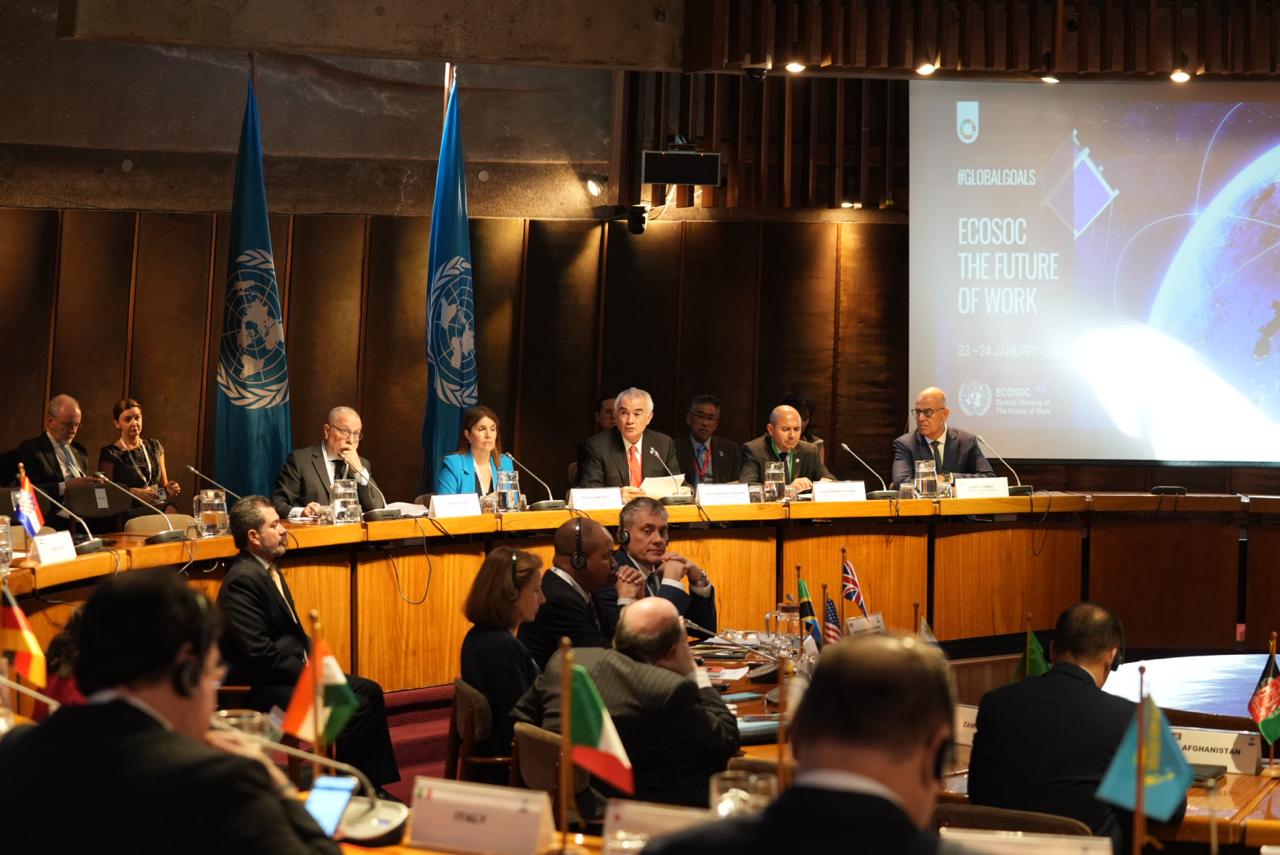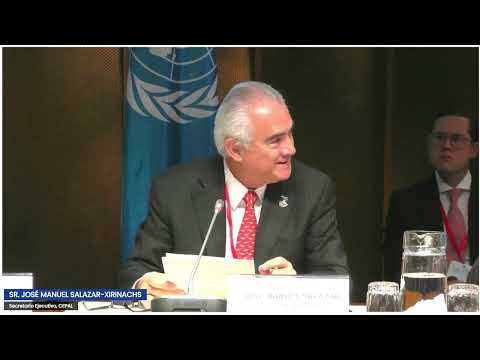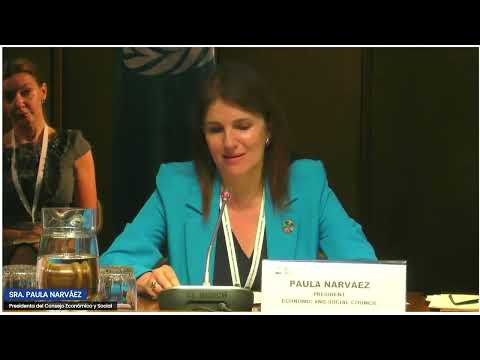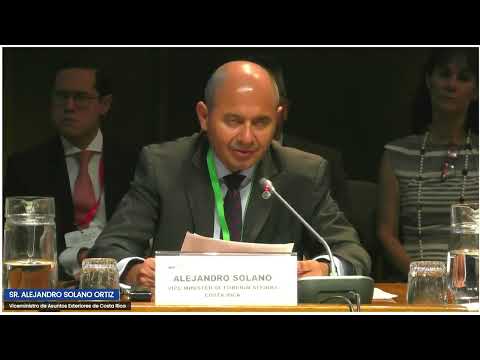Authorities Highlight ECLAC’s Historical Contributions for Moving Towards More Productive, Inclusive and Sustainable Development in Latin America and the Caribbean
Work area(s)
A ceremony to commemorate this United Nations regional commission’s 75th anniversary was held in the framework of the Special Meeting of UN ECOSOC that is taking place in Santiago, Chile.

Authorities from the United Nations Economic and Social Council (ECOSOC) and from the member countries of the Economic Commission for Latin America and the Caribbean (ECLAC) recognized the contributions that this UN regional commission has made throughout its history to foster more productive, inclusive and sustainable development in the region, during a ceremony to commemorate the organization’s 75th anniversary. The event took place today in the framework of the Special Meeting of ECOSOC on the “Future of Work”, which is being held exceptionally in Santiago, Chile.
The commemoration was led by José Manuel Salazar-Xirinachs, ECLAC’s Executive Secretary; Ambassador Paula Narváez, President of ECOSOC and Permanent Representative of Chile to the United Nations; Vice-Minister of Foreign Affairs of Costa Rica, Alejandro Solano Ortiz, on behalf of ECLAC’s member countries; and Argentina’s Ambassador in Chile, Jorge Faurie, in his capacity as representative of the country currently serving as chair of ECLAC (for the 2022-2024 period).
“History tells us that ‘significant innovation’ has often been the outcome of ‘significant challenges.’ ECLAC’s creation is a perfect example of this,” Paula Narváez stated.
ECLAC was established on February 25, 1948 via resolution 106 (VI) of the Sixth Session of ECOSOC. The idea originated with Hernán Santa Cruz, a Chilean lawyer and diplomat who was serving at the time as the Ambassador of Chile to the United Nations and who, with great foresight, presented and successfully negotiated a draft resolution to create an economic commission for Latin America.
“Since then, ECLAC has been a fundamental pillar in support for Latin American and Caribbean countries on public policy development, operational support, consulting, training, technical cooperation, and regional and international coordination and cooperation. Thus, ECLAC has become an incomparable partner in carrying out our development priorities,” the President of ECOSOC underscored.
Meanwhile, Costa Rica’s Deputy Foreign Minister indicated that ECLAC is “the guide in the region’s economic thinking, in light of its evolution and historical challenges. In the last 75 years, ECLAC, through rigorous and profound research on the economy and social and environment development, has been vital for better understanding and addressing our countries’ challenges.”
Argentina’s Ambassador to Chile, Jorge Faurie, acknowledged and praised the Commission’s work over all these years, since 1948, which he said has been “devoted to collaborating with the region’s governments on the economic development of our countries, on improving the standard of living of our people, and on expanding and strengthening trade relations, both inside and outside the region.”
“We can affirm that ECLAC has managed to establish itself, perhaps like no other economic commission in the world’s regions, as a technical support for all the governments of Latin America and the Caribbean, so they can identify the elements that would help them have sustainable, genuine and lasting growth,” Ambassador Faurie added.
In his initial remarks, ECLAC’s Executive Secretary, José Manuel Salazar-Xirinachs, reviewed some of the milestones in ECLAC’s thinking over its seven decades in existence. He indicated that in the beginning and in the 1950s, ECLAC promoted Latin American development through industrialization policies led by the State, as the most efficient way to spread technical progress in a context of trade between the “center” and “periphery” of the global economic system. Later, in the 1960s, the message in favor of “industrialization” incorporated an additional component: the proposal of carrying out institutional reforms – including agrarian, fiscal and financial reforms – that were deemed essential to enabling the continuity and intensification of industrial development.
In the 1970s, Salazar-Xirinachs explained that ECLAC’s thinking advanced along two critical lines: the nature and difficulties of economic growth and industrial development, and income distribution. Meanwhile, in the 1980s, the deep economic and social crisis experienced by the majority of the region’s countries prompted then Executive Secretary Norberto González to dub those years “the lost decade.” During that period, ECLAC worked on analyzing the debt crisis and debt renegotiation alternatives.
In the 1990s, neostructuralism emerges as a current of ECLAC’s thought, aimed at modernizing the Commission’s thinking, adapting it to the changes of that decade and giving it greater visibility. In the first decade of the 21st century, neostructuralism revolved around four major areas: the macroeconomy and finances with an emphasis on countercyclical policies, international trade, social development and environmental sustainability – issues addressed in various influential publications by the Commission.
The Executive Secretary continued by noting that in the 2010s, the concern for equality – which had been present historically in ECLAC’s thinking – gained centrality, as expressed and substantiated in the set of documents known as the “equality trilogy.” He added that the transition to the current decade was dominated by the cascade of crises that has affected the region and the world since the pandemic of 2020. These shocks have very much focused our attention on analyzing the impacts of these cascading crises and on dialogue with governments and other key stakeholders regarding how to manage the effects.
“Our current assessment is that the region finds itself in a true development crisis, which is manifested in three main traps or syndromes: 1) A low-growth trap; 2) A high-inequality trap; and 3) A trap of low institutional capacity and complex and weak governance for coping with the magnitude of the development challenges we have. In sum, the major challenge facing the region’s countries today in terms of development is how, starting now, to make progress on building a more productive, inclusive and sustainable future,” José Manuel Salazar-Xirinachs emphasized.
He indicated that ECLAC has identified 11 major transformations in the development model along with a list of driving or dynamic sectors to achieve higher, more sustained, inclusive and sustainable growth, as well as to accelerate progress and the transitions towards the Sustainable Development Goals (SDGs). These are areas that can be the object of investment, partnerships and international cooperation.
“I assure you that these 75 years of history and contributions by ECLAC, which I’ve summarized, inspire us daily to work arduously and strategically to support countries in forging a more productive, inclusive and sustainable future,” the organization’s Executive Secretary concluded.
Related content
Ceremony to Commemorate the Seventy-Fifth Anniversary of ECLAC
Remarks by José Manuel Salazar-Xirinachs, Executive Secretary of ECLAC.
Type
Country(ies)
- Latin America and the Caribbean
Contact
Public Information Unit
- prensa@cepal.org
- (56 2) 2210 2040



